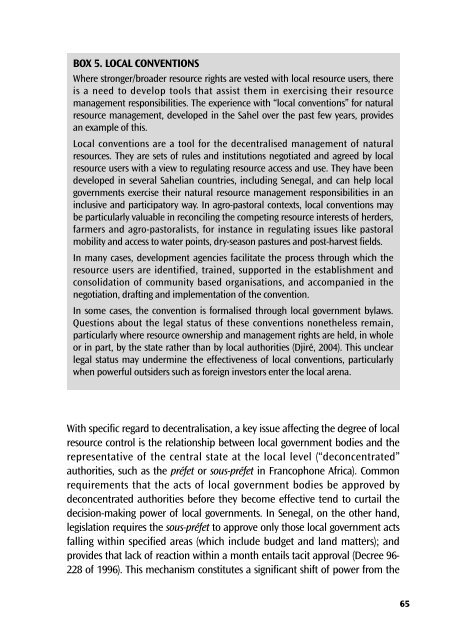Legal empowerment for local resource control
Legal empowerment for local resource control
Legal empowerment for local resource control
Create successful ePaper yourself
Turn your PDF publications into a flip-book with our unique Google optimized e-Paper software.
BOX 5. LOCAL CONVENTIONS<br />
Where stronger/broader <strong>resource</strong> rights are vested with <strong>local</strong> <strong>resource</strong> users, there<br />
is a need to develop tools that assist them in exercising their <strong>resource</strong><br />
management responsibilities. The experience with “<strong>local</strong> conventions” <strong>for</strong> natural<br />
<strong>resource</strong> management, developed in the Sahel over the past few years, provides<br />
an example of this.<br />
Local conventions are a tool <strong>for</strong> the decentralised management of natural<br />
<strong>resource</strong>s. They are sets of rules and institutions negotiated and agreed by <strong>local</strong><br />
<strong>resource</strong> users with a view to regulating <strong>resource</strong> access and use. They have been<br />
developed in several Sahelian countries, including Senegal, and can help <strong>local</strong><br />
governments exercise their natural <strong>resource</strong> management responsibilities in an<br />
inclusive and participatory way. In agro-pastoral contexts, <strong>local</strong> conventions may<br />
be particularly valuable in reconciling the competing <strong>resource</strong> interests of herders,<br />
farmers and agro-pastoralists, <strong>for</strong> instance in regulating issues like pastoral<br />
mobility and access to water points, dry-season pastures and post-harvest fields.<br />
In many cases, development agencies facilitate the process through which the<br />
<strong>resource</strong> users are identified, trained, supported in the establishment and<br />
consolidation of community based organisations, and accompanied in the<br />
negotiation, drafting and implementation of the convention.<br />
In some cases, the convention is <strong>for</strong>malised through <strong>local</strong> government bylaws.<br />
Questions about the legal status of these conventions nonetheless remain,<br />
particularly where <strong>resource</strong> ownership and management rights are held, in whole<br />
or in part, by the state rather than by <strong>local</strong> authorities (Djiré, 2004). This unclear<br />
legal status may undermine the effectiveness of <strong>local</strong> conventions, particularly<br />
when powerful outsiders such as <strong>for</strong>eign investors enter the <strong>local</strong> arena.<br />
With specific regard to decentralisation, a key issue affecting the degree of <strong>local</strong><br />
<strong>resource</strong> <strong>control</strong> is the relationship between <strong>local</strong> government bodies and the<br />
representative of the central state at the <strong>local</strong> level (“deconcentrated”<br />
authorities, such as the préfet or sous-préfet in Francophone Africa). Common<br />
requirements that the acts of <strong>local</strong> government bodies be approved by<br />
deconcentrated authorities be<strong>for</strong>e they become effective tend to curtail the<br />
decision-making power of <strong>local</strong> governments. In Senegal, on the other hand,<br />
legislation requires the sous-préfet to approve only those <strong>local</strong> government acts<br />
falling within specified areas (which include budget and land matters); and<br />
provides that lack of reaction within a month entails tacit approval (Decree 96-<br />
228 of 1996). This mechanism constitutes a significant shift of power from the<br />
65

















